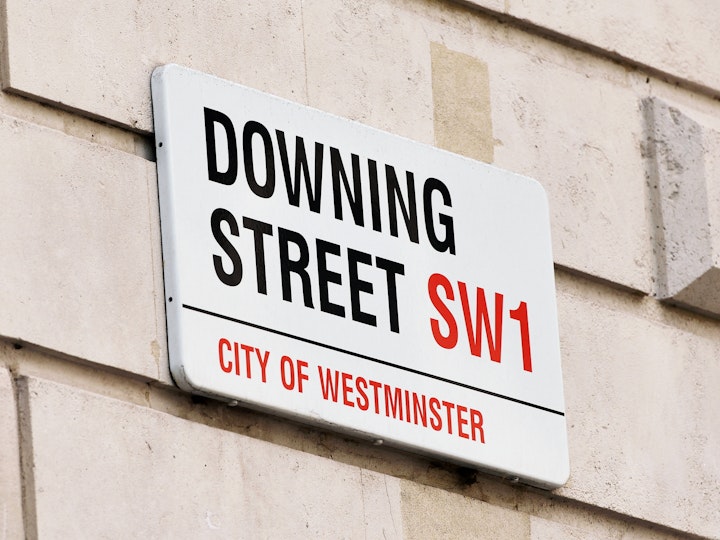Where did Boris go wrong, and how can we learn from it?
Following the news that Boris Johnson is to resign as Prime Minister, academics from Henley Business School have been commenting on how leaders can learn from his mistakes.

Note: This page is being continually updated with new content.
12 July - Professor Kleio Akrivou, Director of Ethics and Sustainability
The leadership quest and the problem of co-existence
The PM’s dramatic resignation is now history, and it is largely due to his own governance choices and shifts in character over time. Also, it is the predictable outcome from a rather long sequence of errors and integrity leaps since Cameron’s premiership days. The recent resignation is also partly due to a culture of competitive ambitious rivalry for the top job and an almost sensual like quest for the top “leadership” role. It’s seen as a holy grail at the end of the quest of self-actualisation, and a chance to play a (better) role defined by a post-truth political landscape in national and global affairs.
In Western public life, leadership has become as a ubiquitous idea as organisations, in terms of understanding public life, governance and influence. It is important we put boundaries in place and narrow our understanding about leadership to ensure it is tied to virtue and also to value it again an essential element attached virtuous participation in civic and public life, and not just a quest for power or the reward of cunning or ambition. Multiple examples from the news coverage of current leadership election - and also from Johnson’s own days in office - suggest that the need to grab and remain in power is linked with throwing integrity out of the window, and suggest integrity is being replaced with an ongoing focus on processes.
The question is: what would be defining in turning a page and having a new PM who turns this vicious cycle back into a virtuous one? The new leader must do this while appreciating the multi-dimensional challenges we face right now (following events in the last decade, many of these of our own doing) and that the policies chosen continue to influence people’s lives and livelihood. On top of this, these issues are intertwined with a deep sustainability related crisis.
The most defining aspect of governance - and what the Conservatives should be looking for in their next leader - is how someone in a key role chooses to resolve the most crucial aspect of governance, which I believe is related to the question of “how to co-exist”. The problem of co-existence in governance is that it crucially involves many groups and people. Some of these are in the ingroup of friends and supporters, and some in the outgroup of people with a different vision. Once these groups are brought together so that there are no winners or losers, everyone can flourish. Here, we solve three problems at once: good and stable leadership and governance, a wider system enabling flourishing, and a decisive step towards better politics; a political system which genuinely cares about a more sustainable and more humane and ecologically balanced world. Let’s wait and see whether the Conservatives can turn over a new leaf. It has been many decades since a political leader has successfully tackled the old problem of co-existence.
8 July 2022 - Professor Bernd Vogel, Director of Henley Centre for Leadership
Style, values and being complicit matter in leading
Research shows that equating positive or negative leadership with just one person is oversimplifying the enormous activities that are involved in leading. It is also belittling to all those who contribute to the shared leading of a team, organisation or in this case, a country.
Despite this academic fact, the qualities individuals bring to leadership matter. As within organizations, understanding and accepting their deeply-seated motives are key to exploring how a person will likely fare in a role. People have discussed for years Boris Johnson’s main motivation to be Prime Minister. He seems to typically fit the personality features which mean that he was more focused on having a role in the history books, and not really about using his position to shape the direction of the country, or being a custodian of the country.
Today is actually a rather dull development because, somewhat predictably, Johnson’s personality got in the way of sustained and hard-worked success. But today could also be a sign of some hope that, at least in a small way, style and values might still matter in positions of responsibility.
Not an individual person’s leadership journey – there are others involved
Another issue in leading are the “others”. It is interesting that core values and attitudes, such as honesty, decency, integrity, humility, dignity, or professionalism, have been cited as key reasons for MPs to withdraw their support for the Prime Minister.
Leadership is a process that involves many people. Leading also means not only to claim leadership, but it being granted by others. Politics is a difficult area, with multiple interests to juggle, and being ruthless is part of it.
So, like at Enron, Wirecard, Volkswagen or other scandals, this is not an individual person’s leadership journey - others are actively involved. It is not healthy for organizations to put all the blame on an individual, when many are part of the process.
This always looked more like Mephistopheles’ pact people had entered. Can anybody really say there were no challenges or questions regarding honesty, decency, integrity, humility, dignity, or professionalism before last week? The question of being complicit come into play for many of the current movers and shakers, both among those who have resigned from government and those who stayed until the bitter end. Machiavellianism is part of politics, but some, as within organizations, will be asked if previously acceptable lines had this time been overstepped.
What next for the Conservative party and politics overall? This is an opportunity to move the dial towards a focus on quality, political leadership, or at least to take a step in the right direction.
7 July 2022 - Aboodi Shabi, Lecturer in Coaching and Behavioural Change
Keeping quiet enables bad behaviour
With all of the focus today on Boris Johnson’s resignation today, much of the media attention is on his failings as a leader.
However, it’s also important to bear in mind, as some commentators are mentioning, that one of the things that enable bad leaders to rise and stay in post, even when their bad behaviour is obvious, is people keeping quiet about things they know to be wrong. Several of those who have resigned in the last few days have spoken about how they grappled with their consciences about whether or not to speak out.
This is a very common issue in organisations, where executives and leaders are faced with problematic behaviour, and keep quiet about it, rather than challenging it. There may be many reasons, not all of them benign, why people don’t stand up to bad leaders – self-interest, career ambition, etc,.
Some of the difficulty of addressing bad leadership behaviour, however, is knowing when or how to speak up. One of the things that can help when we are faced with such dilemmas is having someone to think through the issues with – we are often so caught up in a situation that we can't see the wood for the trees, or are struggling with the challenges and risks of speaking directly to power.
Professional coaching can help by providing a space for executives to reflect on the issues and consider options, in a safe and neutral space. A good coach can be a sounding board to allow someone to explore the best way to move forward, even in the face of someone misusing their leadership position, help people to find their voice, and empower them to stand up for what they know to be right.
When we are caught in a difficult situation, it’s all too easy to feel stuck or disempowered, but having someone outside of ourselves and our organisation can be just what we need to help us re-connect to what we care about and believe in, and then to act powerfully from that place.
7 July 2022 - Dr Sinem Bulkan, Lecturer in Leadership and Organisational Behaviour
Trust and power
Boris Johnson’s violation of lockdown rules implemented during the Covid-19 pandemic was criticised by the nation, his party and the opposition leaders. It was not only the public opinion, but also through a vote of no confidence: 148 Conservative MPs, out of 359, voted that they did not trust Johnson. This has been followed by resignations exceeding 50 members of government in response to Johnson’s willingness to remain in power and continue his role as Prime Minister.
The comments made by his resigned colleagues confirmed their loss of confidence, such as Sajid Javid who remarked “It is clear to me that this situation will not change under your leadership – and you have therefore lost my confidence too.” Rishi Sunak stated that the public expects government to be conducted “properly, competently and seriously”.
Leadership is hard and all leaders may face unprecedented challenges which may trip them up. However, ‘not letting your actions contradict your words’ is the cornerstone of leaders’ trust-building within their followers. Trust needs to be developed by the leader and reflected in their actions, thoughts and decisions. Johnson’s failure, unfortunately, mostly stemmed from losing his authenticity as a leader through breaking his own rules, as well as his unsustainable promises and actions. This created loss of confidence among the public, and it was not long before disagreements elevated within his cabinet.
Although initially supportive of the PM, Rishi Sunak stated in his resignation letter: “On those occasions where I disagreed with you privately, I supported you publicly.” The resignations which swiftly followed also confirmed MPs loss of confidence in him.
As reported today, Boris Johnson has agreed to resign and step down in October. Now, it is time for him and future leaders to reflect on their leadership styles and, most importantly, learn how and when to give up on power rather than being forced out.
6 July 2022 - Dr Chris Dalton, Associate Professor of Management Learning
Boris Johnson can't stay at the top indefinitely, the question is how will he descend?
As events gather pace around him, is Boris Johnson any good at the vital leadership skill of reflecting? We may never know for sure, but on the public evidence of the last few days and weeks, the answer has to be: no, he is not.
When the cracks in the hull of the ship become large enough for the rats to start jumping, what would a self-aware and reflective leader do? In PMQs today, the Prime Minister’s response was “keep going”. This is worrying because whether or not you agree with the policies, and whether or not you like his charm or cringe at his character, an inability to observe, without judgment, the world as it is may be the beginning of the end: a sequence ending in disastrous decision-making on issues with real and lasting consequences.
Every political leader requires some acumen to get to the top. However, that sort of public climb only implies a certain type of relational awareness. If it is one concerned with pleasing or dominating others, or finding validation in the eyes of others, then it can only get a person so far. No doubt every leader needs some of this awareness, but if it is not balanced by an “acumen of the self”, the person will be lost in the external priorities of staying put in their ascent.
But no one stays at the top indefinitely. The only question is how, and not whether, they will descend.
What is going wrong in the Prime Minister’s case is now probably too late to fix. Boris Johnson is not likely to become a self-aware and reflective thinker. He will not place himself beneath the role or in service of something larger than himself.
Acumen needs to look within as well as with-out. It needs to reflect. A person can deny this truth only for so long before context turns around and says “so long”.
6 July 2022 - Dr Rebecca Jones, Associate Professor in Coaching
Ministers' trust in Boris Johnson has been 'fatally ruptured'
Following the resignations of key government ministers, eyes are on the remaining ministers to see who will follow suit. The question is, has a tipping point been reached meaning that Boris Johnson has lost the confidence of the cabinet in his ability to lead the country?
Critical to this confidence is how much ministers’ trust that Johnson can effectively deliver the role of Prime Minister. The sudden flurry of resignations indicates that this trust has been so fatally ruptured that ministers believe their only viable course of action is to step down and withdraw their support. Trust is the cornerstone of all relationships and it is based on:
- Do we believe that the individual has the capability to deliver what we need them to – can Johnson effectively deliver the tasks and duties of Prime Minister?
- Do we believe that the individual will act with integrity – will Johnson do the right thing – acting in a way that is seen as ethical and fair?
- Do we believe that the individual is benevolent or well-meaning – is Johnson in the role of Prime Minister for the ‘right’ reasons – does he genuinely care about the people of Britain?
Multiple examples from the news coverage of Johnson suggests that it is likely that he has compromised all three of these areas and therefore any trust in him as Prime Minister has gone. As more resignations follow, the remaining ministers may even start to question their own judgment of Johnson and the trust they have placed in him."






